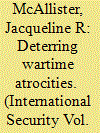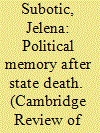| Srl | Item |
| 1 |
ID:
170593


|
|
|
|
|
| Summary/Abstract |
Advocates of wartime international criminal tribunals (ICTs) hope that such tribunals can deter combatant atrocities against civilians. Yet, more than twenty-five years after the establishment of the first wartime ICT—the International Criminal Tribunal for the former Yugoslavia (ICTY)—wartime ICTs’ role in deterring such violence remains a matter of debate. Insights from criminology, as well as research on civil conflicts and international legal compliance, suggest that ICTs are most likely to deter government and rebel forces from committing atrocities against civilians when all three of the following conditions are present: (1) ICT officials have secured sufficient prosecutorial support, (2) combatant groups rely on support from liberal constituencies, and (3) combatant groups have centralized structures. Case studies of the ICTY's impact on fourteen combatant groups from the Yugoslav conflicts—combined with hundreds of field interviews with war veterans and others—confirm this prediction. The ICTY's record thus sheds important light on how and when contemporary wartime ICTs—including the International Criminal Court—might succeed in deterring combatant atrocities against civilians.
|
|
|
|
|
|
|
|
|
|
|
|
|
|
|
|
| 2 |
ID:
167597


|
|
|
|
|
| Summary/Abstract |
This article explores the relationship between political memory, state ontological security, and populist movements after state death. When a state dies, ideological space opens up for new state agents to narrate a different version of the past, one that delegitimizes the ideological underpinning of the old state order and creates ontological insecurity in the new polity. Populism becomes an especially attractive ideology, as it feeds on a sense of insecurity at home and abroad. The argument is illustrated with the case study of transformed Holocaust remembrance after the death of Yugoslavia. Tracing the history of the Yugoslav memorial exhibition at Auschwitz, the article demonstrates ways in which post-Yugoslav Holocaust remembrance has focused on delegitimizing Yugoslavia’s communist past, especially its antifascism. Once antifascism is removed from state political memory, political space opens up for a revival and ideological normalization of populist—and at its most extreme—fascist ideological movements in the present.
|
|
|
|
|
|
|
|
|
|
|
|
|
|
|
|
| 3 |
ID:
109172


|
|
|
|
|
| Publication |
2011.
|
| Summary/Abstract |
The article focuses on the co-constitution of political subjectivities, political regimes and global political economy by exploring experiences of international travel by ordinary Yugoslav citizens. Political non-players (Ashis Nandy (1998) The intimate enemy: loss and recovery of self under colonialism (New Delhi: Oxford University Press)) and their everyday practices are key protagonists in the narrative of border crossings, migrations, translocations and regime sustenance. Taking a cue from Peter Taylor's (Modernities (Minneapolis: University of Minnesota Press, 1999)) analysis of 'ordinary modernity', the article examines the ways in which foreign travel helped create 'ordinary comfort' for 'ordinary citizens' in the Yugoslav communist experiment. The temporal focus is on the 1970s-time of grave economic crisis in Western Europe and the United States-and, thanks to petro-dollar debt, the time of unprecedented prosperity and largesse in Yugoslavia. By looking at the variety of ways ordinary Yugoslavs travelled abroad and the representations of 'abroad' at home, the article explores the ways in which inostranstvo (the foreign world, the international) and its imaginary came to the rescue of the national, and how the liberty of travel (always contrasted to the 'prison' of other communist countries) obfuscated political and economic problems within.
|
|
|
|
|
|
|
|
|
|
|
|
|
|
|
|